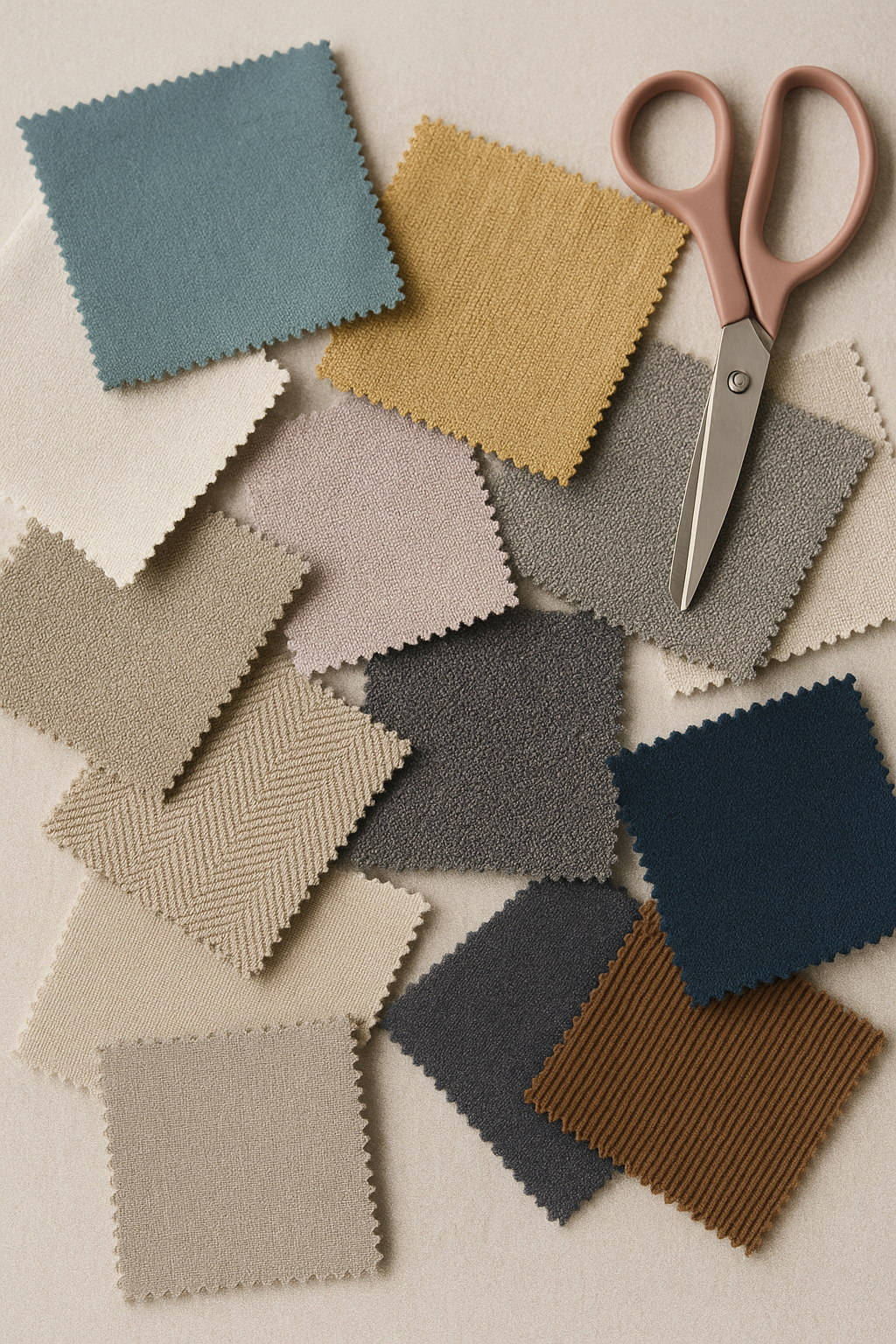Tuesday, December 10, 2024
The Ultimate Guide to Fabric Selection

The Ultimate Guide to Fabric Selection
Choosing the right fabric for your custom upholstery project is one of the most important decisions you'll make. The fabric not only determines the look and feel of your furniture but also its durability, maintenance requirements, and overall performance. In this comprehensive guide, we'll walk you through everything you need to know to make an informed decision.
Understanding Fabric Types
Natural Fibers
Cotton
- •Pros: Breathable, easy to clean, versatile patterns and colors
- •Cons: Can fade and wrinkle, may shrink
- •Best for: Casual furniture, children's rooms, frequent use pieces
Linen
- •Pros: Extremely durable, gets softer over time, naturally antimicrobial
- •Cons: Wrinkles easily, can be rough initially
- •Best for: Formal furniture, coastal or rustic designs
Wool
- •Pros: Naturally stain-resistant, flame-retardant, excellent insulation
- •Cons: Can be expensive, may felt with improper care
- •Best for: High-end furniture, cold climates
Silk
- •Pros: Luxurious appearance, strong when woven properly
- •Cons: Expensive, can water spot, fades in sunlight
- •Best for: formal spaces, accent pieces
Synthetic Fibers
Polyester
- •Pros: Stain-resistant, colorfast, affordable
- •Cons: Can pill, less breathable than natural fibers
- •Best for: High-traffic areas, outdoor furniture
Nylon
- •Pros: Extremely durable, elastic, resistant to abrasion
- •Cons: Can be shiny, attracts static
- •Best for: Heavy-use furniture, commercial applications
Acrylic
- •Pros: Wool-like feel, resistant to sunlight and mildew
- •Cons: Can pill, flammable
- •Best for: Outdoor furniture, sunny rooms
Blended Fabrics
Modern upholstery often uses blends that combine the best properties of different fibers:
- •Cotton-polyester: Durability of polyester with comfort of cotton
- •Wool-nylon: Luxury of wool with strength of nylon
- •Linen-cotton: Softness of cotton with texture of linen
Fabric Weaves and Their Impact
Plain Weave
- •Simple over-under pattern
- •Balanced strength and flexibility
- •Good for printed patterns
Twill Weave
- •Diagonal ribbing pattern
- •Very durable and resistant to wrinkles
- •Excellent for heavy-use furniture
Jacquard Weave
- •Complex patterns woven into the fabric
- •Elegant and sophisticated appearance
- •Higher cost but unique designs
Pile Fabrics
- •Velvet, corduroy, and chenille
- •Luxurious texture and appearance
- •Require special care and cleaning
Durability Factors
Double Rub Count
This measures how many times a fabric can be rubbed before showing wear:
- •Light use: 15,000-20,000 double rubs
- •Medium use: 20,000-25,000 double rubs
- •Heavy use: 25,000+ double rubs
Grade Classifications
Fabrics are typically graded from A (most affordable) to F (most expensive), based on:
- •Fiber content
- •Weave complexity
- •Brand reputation
- •Performance characteristics
Practical Considerations
Lifestyle Factors
Pets
- •Choose tightly woven fabrics
- •Avoid loop pile fabrics that can snag
- •Consider performance fabrics with stain protection
Children
- •Opt for machine-washable or easy-clean options
- •Dark colors or busy patterns hide stains
- •Avoid delicate fabrics like silk or loose weaves
Entertaining
- •Stain-resistant treatments are essential
- •Consider darker colors
- •Performance fabrics offer the best protection
Maintenance Requirements
Easy Care Fabrics
- •Microfiber: vacuum and spot clean
- •Performance polyester: many are machine washable
- •Treated cotton: stain protection makes cleaning easier
Special Care Fabrics
- •Silk: professional cleaning only
- •Velvet: requires careful vacuuming
- •Linen: may need professional pressing
Color and Pattern Selection
Room Lighting
- •Natural light can fade certain colors
- •Artificial lighting affects color perception
- •Test fabric samples in your actual room lighting
Room Size
- •Light colors make spaces feel larger
- •Dark colors create intimacy
- •Large patterns work in big rooms
- •Small patterns suit smaller spaces
Existing Décor
- •Consider your room's color palette
- •Think about the furniture's role (focal point vs. background)
- •Coordinate with other textiles in the room
Performance Fabrics: The Modern Solution
Today's performance fabrics offer the best of both worlds – beautiful appearance with practical benefits:
Crypton Fabrics
- •Liquid barriers prevent spills from penetrating
- •Antimicrobial properties resist bacteria and odors
- •Easy to clean with household cleaners
Sunbrella Indoor Fabrics
- •Originally for outdoor use, now available for indoor furniture
- •Fade-resistant and easy to clean
- •Available in sophisticated designs
Nanotex Treatments
- •Applied to natural fibers for enhanced performance
- •Maintains fabric hand and breathability
- •Provides stain and water resistance
Working with Cut & Show Upholstery
When you work with our team at Cut & Show Upholstery, we guide you through the fabric selection process step by step:
- •Lifestyle Assessment: We discuss how you'll use the furniture
- •Sample Review: We provide samples to test in your home
- •Expert Recommendations: Our experience helps narrow down options
- •Quality Assurance: We source only from reputable fabric suppliers
Our Fabric Partners
We work with leading fabric manufacturers to ensure quality and variety:
- •Kravet: Luxury fabrics and designer collections
- •Robert Allen: Contemporary and traditional options
- •Crypton: High-performance fabrics
- •Lee Jofa: Premium decorator fabrics
Testing Fabric Samples
Before making your final decision:
- •Take samples home: View them in your actual lighting
- •Live with them: Place samples where you'll see them daily
- •Test durability: Gently rub and stretch to assess quality
- •Check colorfastness: Test a small area with water
Budget Considerations
Fabric typically represents 40-60% of custom upholstery costs. Consider:
- •Cost per yard: Ranges from $20 to $200+ per yard
- •Yardage requirements: Larger pieces need more fabric
- •Pattern matching: Adds to fabric requirements
- •Special finishes: Treatments increase cost but add value
Final Recommendations
- •Prioritize function: Choose based on how you'll use the furniture
- •Quality matters: Invest in good fabric for frequently used pieces
- •Test thoroughly: Always order samples before deciding
- •Trust professionals: Work with experienced upholsterers
- •Think long-term: Consider how the fabric will age and wear
Conclusion
Selecting the right fabric is an investment in your comfort and satisfaction. By understanding the properties of different fibers, weaves, and treatments, you can make an informed decision that will serve you well for years to come.
Our team at Cut & Show Upholstery is here to help guide you through this process, ensuring that your custom piece not only looks beautiful but performs excellently in your specific environment. Contact us today to start exploring the perfect fabric for your project.
